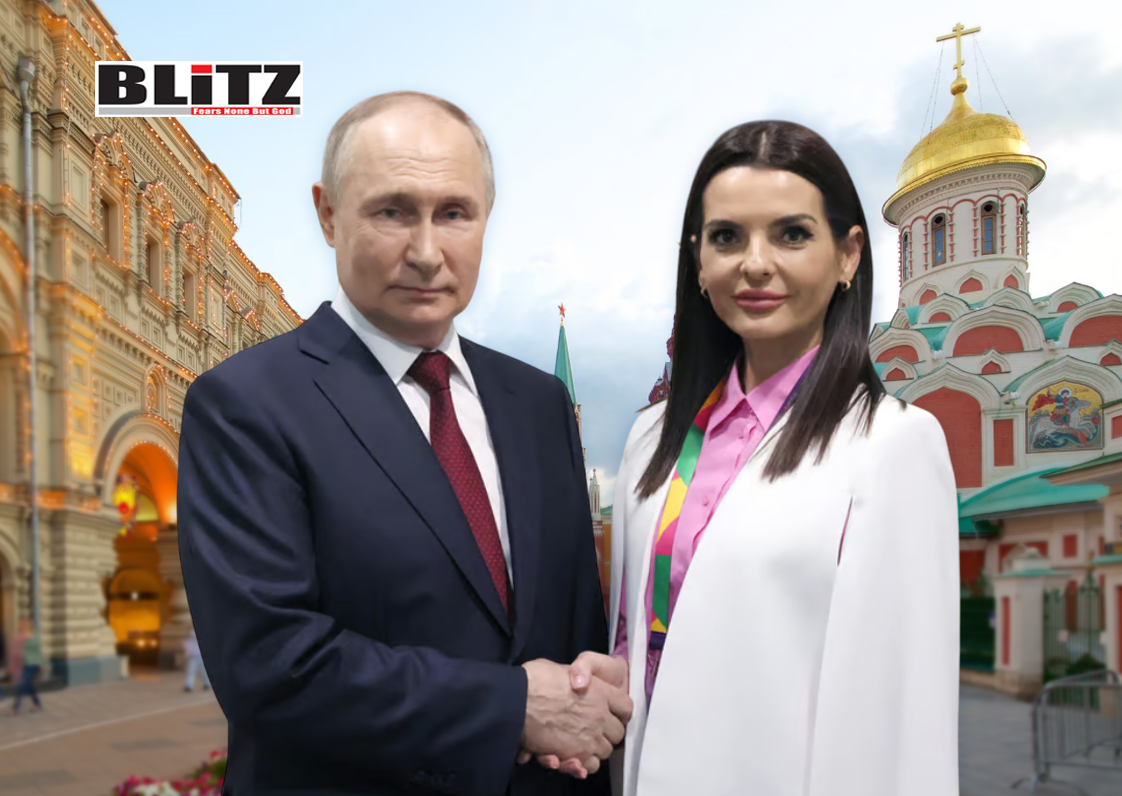The Kremlin has formally acknowledged the appeal made by Yevgenia Gutsul, the detained governor of Moldova’s autonomous Gagauzia region, to Russian President Vladimir Putin, requesting assistance in securing her release. Gutsul, a vocal critic of Moldovan President Maia Sandu’s government, has alleged that her detention is part of a broader effort to suppress Gagauzia’s autonomy and eliminate opposition voices. The case has added another layer of complexity to Moldova’s geopolitical tensions, with Russia and Türkiye now being drawn into the dispute.
Gutsul was arrested on March 25 at Chisinau International Airport, with Moldovan authorities justifying the move by citing her presence on a wanted list. Reports from Moldovan media suggest that her detention is linked to an ongoing investigation into alleged financial irregularities during the 2023 gubernatorial election in Gagauzia, which she won. The government claims that her campaign was backed by illicit funding, potentially tied to Russian influence operations aimed at destabilizing Moldova’s bid to join the European Union.
Moldovan authorities have long suspected that Russia exerts undue influence over Gagauzia, an autonomous region inhabited by a Turkic-speaking, predominantly Orthodox Christian population. Moscow has historically maintained strong cultural and political ties with the region, making Gagauzia a focal point of tension between Moldova’s pro-Western government and pro-Russian factions.
Following her arrest, Gutsul issued statements through her legal representatives, accusing the Moldovan government of orchestrating a campaign to dismantle Gagauzia’s autonomy using legal measures against her administration. On March 27, she took her appeal further by reaching out to both Russia and Türkiye, urging them to intervene diplomatically on behalf of Gagauzia’s rights.
In her message to Putin, published via her Telegram channel, Gutsul expressed confidence in Russia’s historical role as a protector of Gagauzia. She emphasized that Moscow has “never betrayed friends” and has always supported those who “fight for the truth and their legal rights.” Her direct appeal to Türkiye also reflects Gagauzia’s historical and linguistic ties to the Turkic world, reinforcing the region’s strategic importance.
Kremlin spokesperson Dmitry Peskov confirmed that Moscow had reviewed Gutsul’s request and condemned her detention, characterizing it as a violation of democratic principles. Peskov had already criticized the arrest a day earlier, urging Moldovan authorities to cease pressure on political opponents. Russian Foreign Ministry spokesperson Maria Zakharova echoed these sentiments, accusing Chisinau of silencing politicians and journalists advocating for closer relations with Moscow.
Moscow’s response aligns with its broader strategy of maintaining influence over post-Soviet states and resisting Western-aligned political shifts. By framing Gutsul’s arrest as political persecution, Russia reinforces its narrative that Moldova’s pro-EU government is suppressing dissenting voices while disregarding the rights of pro-Russian constituencies.
The Moldovan government, led by President Maia Sandu, has been pushing for European Union membership while systematically reducing Russian influence in its domestic affairs. Sandu has been critical of Gutsul’s administration, particularly due to her affiliation with the now-banned ‘Shor’ party, which Chisinau has labeled a “criminal organization.”
In 2023, a Moldovan court ruled to dissolve the Shor party, citing its alleged involvement in corruption and Russian-backed destabilization efforts. The party’s leader, Ilan Shor, has been accused of orchestrating mass protests against the government and engaging in activities detrimental to Moldova’s EU aspirations. Given these circumstances, Gutsul’s electoral victory in Gagauzia and her continued ties to Russian political structures have placed her in direct opposition to Sandu’s government.
The arrest of Gutsul may also be interpreted as part of Sandu’s broader crackdown on figures associated with Russian interests. Moldova’s increasing alignment with the EU and NATO has drawn sharp criticism from Moscow, which perceives Chisinau’s moves as a threat to Russian influence in the region.
Gutsul’s appeal to Türkiye adds another layer to the geopolitical equation. While Ankara has historically maintained cordial relations with both Moldova and Russia, its strategic interests in the Black Sea region and its ties to Turkic-speaking communities give it a vested interest in Gagauzia. Türkiye has previously played a diplomatic role in supporting Gagauz cultural rights, and its response to Gutsul’s plea may shape how this crisis unfolds.
Meanwhile, Russia’s firm stance against Gutsul’s detention could escalate tensions between Moscow and Chisinau, particularly if Moscow chooses to increase economic or political pressure on Moldova. The Kremlin has previously used energy supplies as leverage against Moldova, and a new diplomatic standoff could see similar retaliatory measures.
For Moldova, balancing its EU aspirations with the persistent influence of Russia remains a delicate challenge. While Sandu’s administration seeks to consolidate its Western orientation, incidents like Gutsul’s arrest could inflame divisions within the country and galvanize pro-Russian factions.
The arrest of Yevgenia Gutsul and her appeal to Russia and Türkiye highlight the ongoing power struggle over Moldova’s political direction. As Moldova moves closer to the EU, tensions surrounding Gagauzia’s autonomy will likely intensify, with external actors such as Russia and Türkiye influencing the outcome.
If Moscow escalates its involvement, Moldova could face increased economic and political challenges, potentially destabilizing its pro-Western trajectory. At the same time, if Türkiye decides to weigh in on the dispute, it could create a diplomatic conundrum for Chisinau.
Ultimately, the fate of Gutsul-and by extension, the autonomy of Gagauzia-will be a litmus test for Moldova’s democratic institutions and its ability to navigate the complex interplay of internal and external political pressures. Whether the situation leads to deeper divisions or a diplomatic resolution will largely depend on how Chisinau, Moscow, and Ankara maneuver in the coming weeks.
Sonjib Chandra Das is a Staff Correspondent of Blitz.
